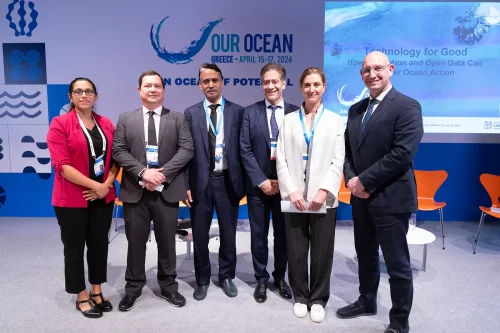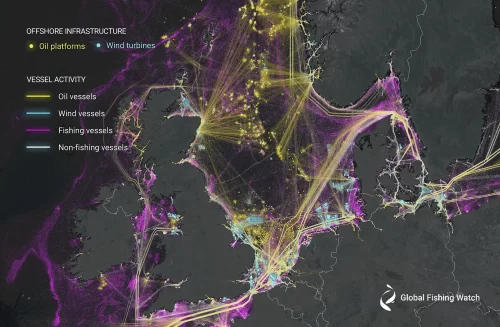Momentum builds in Pacific as Palau joins progressive countries committed to publicly sharing vessel tracking data
NEW YORK, U.S. – Global Fishing Watch welcomes a new partnership with Palau that aims to strengthen sustainable fisheries management and promote transparency as a principle of ocean governance.
The agreement, which was signed between Global Fishing Watch and Palau’s Ministry of Agriculture, Fisheries and Environment, establishes a collaborative framework for publicly sharing the country’s vessel tracking data, which is aggregated and shared through the Fisheries Information Management System. The memorandum of understanding also reinforces the two parties’ commitment to the development of robust ocean governance policies—a longstanding priority for the Pacific island nation.
Announced this week at the 78th Session of the United Nations General Assembly, the partnership marks a cooperative effort that will enable joint work and demonstrate the various ways the fisheries sector can embrace open data to enhance management decisions and increase transparency across the seafood supply chain.
“By making our vessel tracking data publicly available on the Global Fishing Watch map, we hope to increase transparency and accountability of fishing activities in our waters,” said the Honorable Steven Victor, Minister of Agriculture, Fisheries, and the Environment, Palau. “This can drive sustainability of our resources and contribute to reducing illegal activities in our ocean.”
“Palau has consistently demonstrated leadership in marine conservation and fisheries management,” said Tony Long, chief executive officer of Global Fishing Watch. “This partnership underscores our mutual commitment to combating illegal fishing while also signaling transparency as a powerful tool in driving responsible fishing practices. We hope other countries will follow their lead.”
Palau and Global Fishing Watch share a common interest in safeguarding marine biodiversity and promoting sustainable fisheries and resource management. Under their partnership, Global Fishing Watch will provide analytical support based on the examination of vessel behaviors, fleet patterns, and trends associated with port inspections, licensing and enforcement efforts. This information exchange can help inform the country’s ongoing development of its national fisheries policy and marine spatial plans, and will also strengthen its regional and international influence in support of ocean governance initiatives.
With an exclusive economic zone spanning over 232,000 square miles (600,000 square kilometers), Palau is committed to robust management of its industrial and small-scale fisheries—compliance is the cornerstone for the country’s long lasting economic benefits derived from its marine resources. The Pacific is home to the planet’s most productive tuna fisheries, producing over half of the global tuna catch, estimated to be worth about $26 billion each year. Thanks to continued leadership from national governments and regional institutions, all of the major tuna stocks in the Western and Central Pacific Ocean are currently considered to be sustainably fished. Palau’s commitment to further enhancing fisheries transparency will support continued efforts to highlight and maintain the successes of the region.
As a member of the Pacific Island Forum Fisheries Agency, the Parties to the Nauru Agreement, and the Western & Central Pacific Fisheries Commission, Palau has also been a leading voice on ocean protections. In 2022, Palau hosted the 7th Our Ocean Conference, bringing global attention to various marine issues, including the ocean-climate crisis, small-scale fisheries, and illegal fishing, which accounts for over $300 million worth of tuna in the Pacific region alone. The event led to 410 commitments worth over $16 billion USD, setting a positive example for the global community.
Palau joins Papua New Guinea and the Republic of the Marshall Islands who have committed to making their vessel tracking data publicly available via Global Fishing Watch’s map. With continued support from Bloomberg Philanthropies, the nonprofit organization remains committed to advancing transparency as a principle of ocean governance and working with countries from around the world to make its technology and analytical tools available to advance policy decisions.

